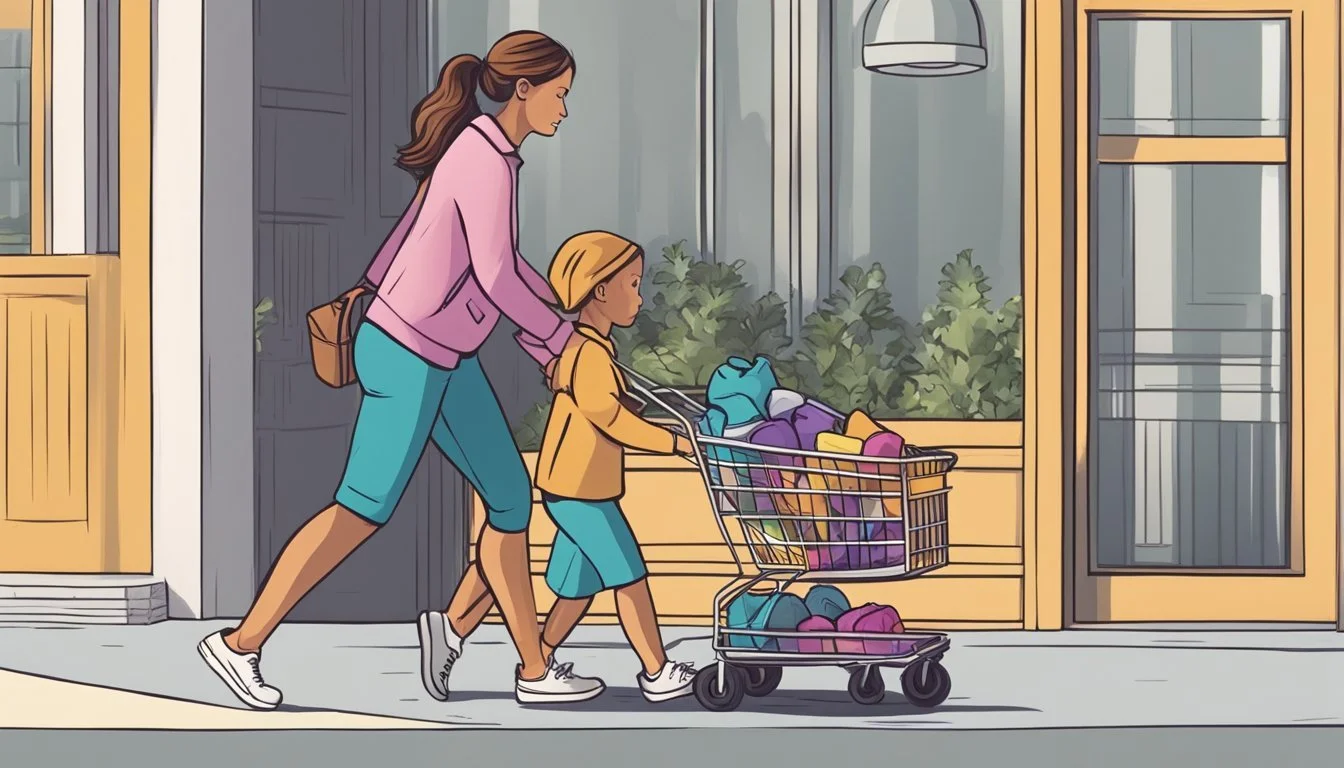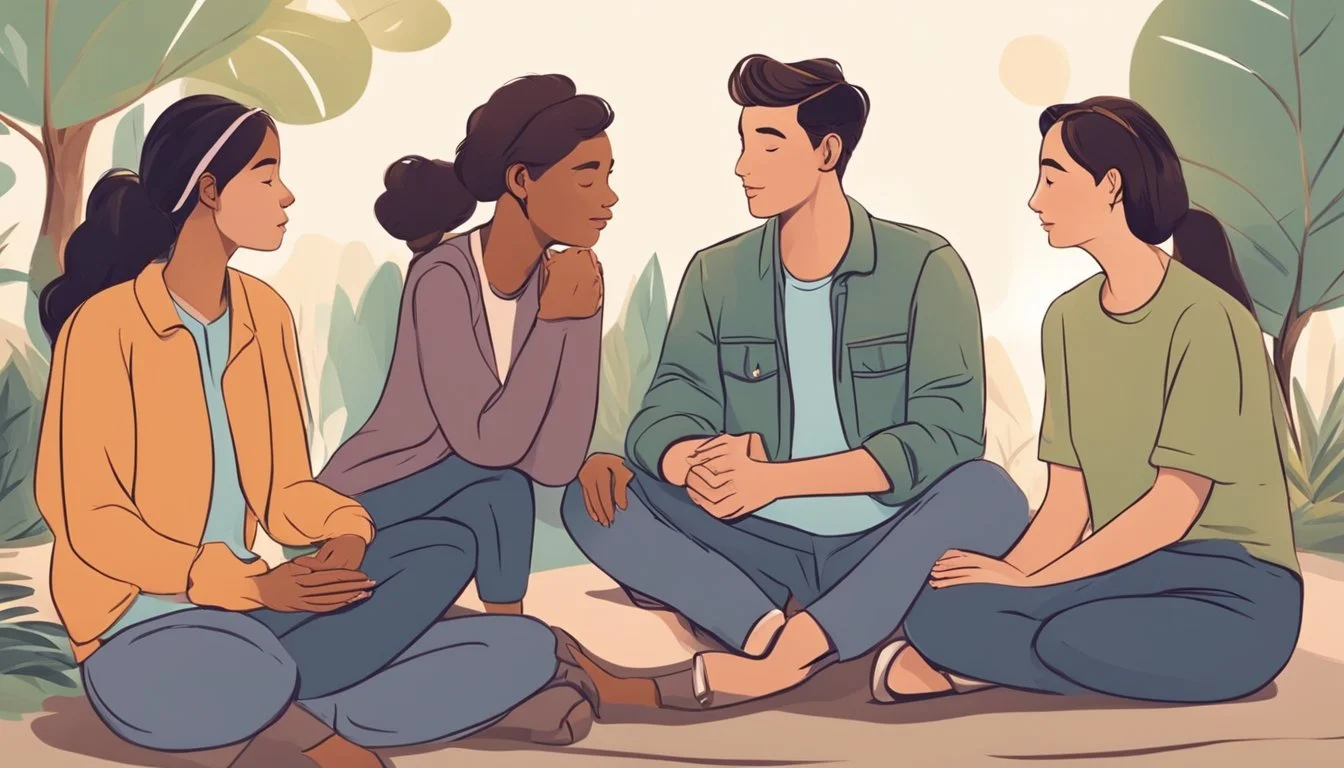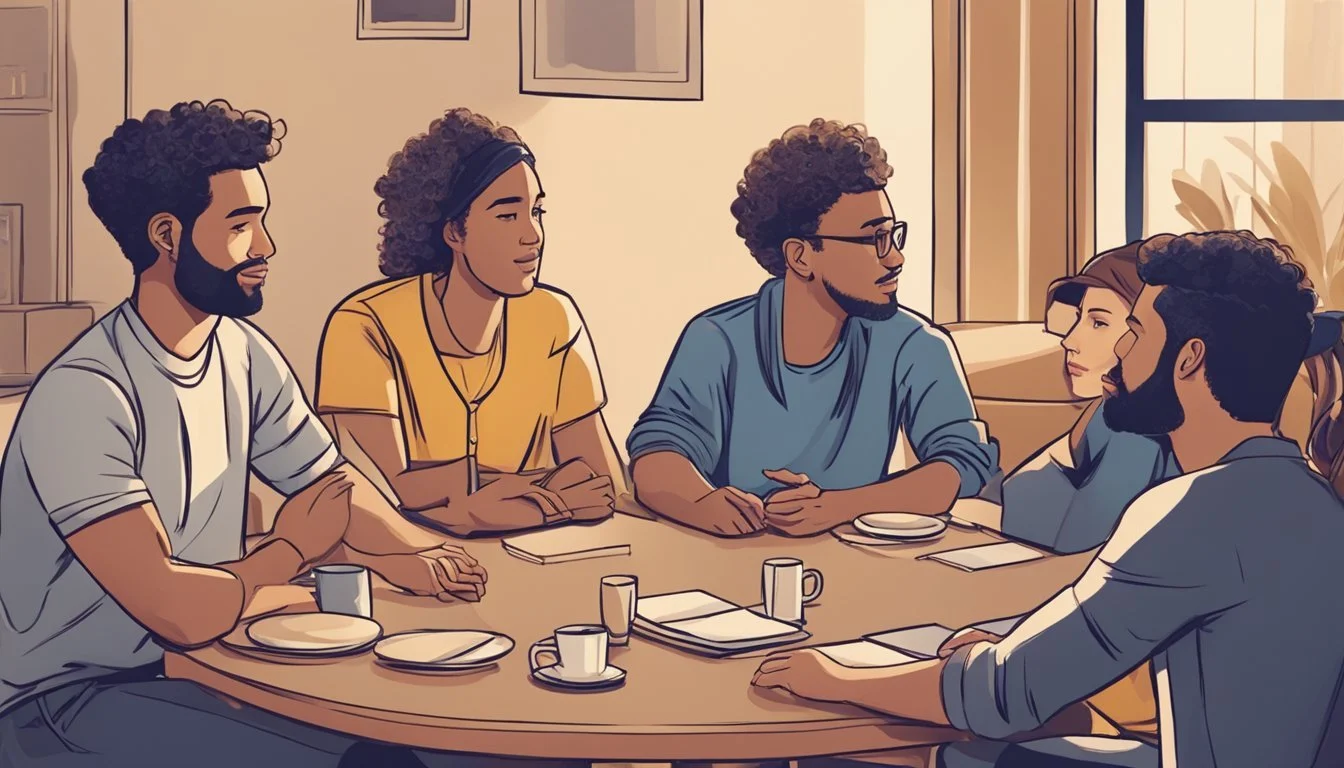7 Ways to Support a Friend Who's Going Through a Divorce Effectively
Going through a divorce can be one of the most challenging and isolating experiences for anyone. This period often brings a mix of intense emotions, including sadness, anger, and confusion. Supporting a friend who's navigating this difficult time is crucial and can make a significant difference in their emotional wellbeing.
Understanding how to offer effective support without overstepping boundaries is essential. Many people want to help but are unsure of the best ways to provide comfort and assistance. This article explores practical and thoughtful ways to support a friend during their divorce, helping them feel less alone and more resilient.
1) Offer a Listening Ear
When a friend is going through a divorce, one of the most important things you can do is to offer a listening ear. Divorce brings a whirlwind of emotions, from sadness to anger to confusion. By being there to listen, you provide them with much-needed support.
Listening attentively helps your friend release pent-up feelings. It allows them to talk through the complexities of their situation without judgment.
It's crucial to let them speak at their own pace. Resist the urge to interject with advice or opinions unless specifically asked. They often just need someone to hear them out.
Active listening can involve simple nods, maintaining eye contact, and using non-verbal cues to show you're engaged. These small actions can go a long way in comforting your friend.
Repetition may occur, as they process their emotions. Letting them talk through their thoughts multiple times can help them come to terms with their situation. This repetitive dialogue is a natural part of healing.
For more tips on supporting a friend through divorce, consider reading this article. Offering a listening ear shows your friend that they are not alone during this difficult time.
2) Help with errands or childcare
Supporting a friend during a divorce can involve practical help, such as offering to take on errands or assisting with childcare tasks.
Running errands like picking up groceries, handling laundry, or taking the car for maintenance can alleviate the daily stress a friend might face.
Childcare support is another crucial area. Offering to watch the kids while your friend attends meetings with lawyers or takes time for self-care can significantly ease their burden. This allows them to focus on managing their emotions and navigating the legal aspects of the divorce.
Even occasional help, like carpooling kids to activities or helping with homework, can make a big difference.
By stepping in to handle these everyday tasks, friends can provide meaningful relief and show unwavering support in a difficult time.
3) Suggest Professional Counseling
Encouraging your friend to seek professional counseling can be an effective way to support them through their divorce. Therapy provides a safe space to process emotions, identify healthy coping strategies, and gain insights from a trained professional.
It’s important to approach this suggestion with empathy and understanding. Mention that seeking help from a therapist or counselor can offer specialized support during this challenging time.
Counseling can be particularly beneficial if the divorce involves complicated dynamics or trauma. Professional therapists are equipped to handle such intricacies and can help your friend navigate their emotions constructively.
Recommending therapy or divorce recovery groups shows your friend that acknowledging the need for help is a sign of strength, not weakness. Therapy allows them to explore their feelings deeply and work toward healing.
4) Join Them in Leisure Activities
Participating in leisure activities can be a great way to support a friend going through a divorce. Activities such as hiking, going to the movies, or exploring new hobbies can provide a much-needed distraction from their emotional turmoil.
Invite them to join you for walks in the park or casual bike rides. Physical activity can help alleviate stress and improve mood. It’s a way to stay connected and offer emotional support without being intrusive.
Encouraging your friend to take up new hobbies or revisit old ones can also be beneficial. Whether it’s painting, cooking classes, or joining a book club, these activities can help them rediscover joy and build a new routine.
Sometimes, simply being present during everyday activities like grocery shopping or running errands can make a big difference. Your companionship can provide comfort and stability during a challenging time.
Each person's needs and preferences are different, so it's important to be flexible and considerate of what they might enjoy. Joining them in enjoyable activities will help relieve some of the emotional strain and reinforce your support.
5) Respect Their Healing Process
Healing from a divorce is unique to each individual. Some may bounce back quickly, while others might need more time. It's essential to respect their timeline and avoid imposing expectations on how long they should grieve or recover.
Give your friend space to experience their emotions at their own pace. Avoid pushing them to move on or offering unsolicited advice on how they should feel.
Encourage them to take small steps toward recovery, but let them dictate the pace. If they need to talk, listen without judgment. If they need solitude, give it to them.
Understand that healing isn't linear. There will be good days and bad days. Consistently offer support, even during the fluctuating stages of their recovery process.
Remind them that it's okay to seek professional help. Therapy can be a valuable tool in navigating the complex emotions associated with divorce. Encourage them gently, but respect their decision.
By showing patience and understanding, you foster an environment where your friend feels comfortable processing their emotions. This demonstrates that you’re there for them unconditionally. If you're looking for more ways to support them, check out these tips on Oprah Daily.
6) Encourage Self-Care
Encouraging self-care for a friend going through a divorce is crucial. Divorce can be exhausting and stressful, taking a toll on physical and mental health. Remind them to focus on basic self-care activities.
Suggest taking up a hobby or revisiting an old one. Activities like painting, gardening, or reading can provide a meaningful distraction and a sense of accomplishment.
Recommend physical activities such as yoga, walking, or joining a local gym. Physical exercise is not only good for the body but also helps reduce stress and enhance mood.
Encourage them to maintain a healthy diet. Simple meal planning or cooking together can provide both nourishment and a sense of community.
Consider offering some self-care items. Self-care packages with essential oils, bath salts, or a favorite book can provide much-needed relaxation and comfort. You can learn more about these ideas from 21 Comforting Things.
Listen to their needs and respect their boundaries. Giving space and time to process emotions is vital. Sometimes, just knowing that there is someone who cares can be incredibly comforting.
In summary, focusing on encouraging self-care helps rebuild a sense of control, well-being, and normalcy during a challenging time.
7) Help them stay social
Encouraging a friend to remain social during a divorce is crucial. Prolonged isolation can take a toll on their mental health and well-being. Invite them to social gatherings, even if they decline at first. Keeping the invitation open signals that they're welcome.
Regular social interactions can help them feel connected and supported. Suggest going for a walk, having a coffee, or attending local events together. Even small activities can make a big difference.
Staying connected with their existing social network is important. Encourage them to maintain relationships with mutual friends and family members. They may need a gentle push to stay engaged.
Organize group activities that include only positive and supportive people. Creating a safe space where they can interact without judgment can help them feel more comfortable. Being surrounded by caring individuals can lift their spirits.
Offer to accompany them to social events where they might feel uncomfortable attending alone. Your presence can provide the reassurance they need to get out and be active. This can ease their transition into a normal social life again.
Understanding Emotions
When supporting a friend through a divorce, understanding the complex emotions they may experience is essential. These feelings can range from sorrow to anger, and recognizing them helps in offering the right kind of support.
Recognizing Common Feelings
Individuals going through a divorce often experience a spectrum of emotions. Common feelings include sadness, grief, anger, and relief.
Sadness and grief arise from the loss of partnership and unfulfilled future plans. Anger might stem from perceived betrayals or injustices within the relationship. Relief can occur if the relationship was particularly stressful or harmful.
Recognizing these emotions helps in offering empathetic and non-judgmental support. It's important to validate these feelings without trying to fix them. A simple acknowledgment like, "I understand you're feeling really hurt," can be incredibly supportive.
The Emotional Roller Coaster
The process of divorce is rarely linear. One day, your friend might feel optimistic about the future; the next, they might be overwhelmed with sorrow or anger.
This unpredictability is part of the emotional roller coaster experienced during separation. It’s crucial to remain patient and understanding, allowing them to express their emotions freely.
Encouraging them to talk openly and seek professional help, such as therapy or support groups, can also be beneficial. Offering a listening ear without judgment provides significant emotional support, allowing them to process their feelings at their own pace.
Effective Communication
Communicating effectively with a friend going through a divorce involves listening actively and providing genuine, empathetic support. This approach helps them feel heard and understood.
Active Listening Techniques
Active listening is more than just hearing words; it's about fully engaging with the speaker. Encourage your friend by maintaining eye contact and nodding, which shows you are attentive.
Avoid interrupting while they speak. This allows them to express themselves without feeling rushed or judged. Instead, use phrases like "I understand" or "That sounds tough" to show empathy and encourage further sharing.
Paraphrase their statements to confirm understanding. For example, say, "It seems like you're feeling overwhelmed by everything." This clarifies their feelings and illustrates your engagement.
Lastly, be patient and give them the space to share their emotions, even if it's repetitive. Letting them talk about their feelings helps them process their grief and confusion.
Offering Genuine Support
Providing genuine support involves more than just verbal affirmation. Offer practical help, such as assisting with daily tasks or chores. This allows your friend to focus on their emotional wellbeing without additional stress.
Say things like, "I'm here for you," to reassure them that they have a reliable support system. This simple yet powerful statement can mean a lot to someone feeling isolated.
Be honest in your reactions. If you don’t know what to say, it’s better to admit it than to provide insincere comfort. Also, refrain from offering unsolicited advice. Often, people need to vent rather than receive solutions.
Lastly, be consistent in your support without being overbearing. Regular check-ins, either through calls or messages, show sustained care and concern without intruding on their personal space.
Encouraging Healthy Coping Mechanisms
Healthy coping mechanisms play a crucial role in navigating the emotional turmoil of a divorce. Encouraging friends to adopt such strategies can significantly aid in their emotional and psychological recovery.
Promoting Self-Care
Self-care is essential for someone going through a divorce. Encourage your friend to engage in activities that promote physical, emotional, and mental well-being. Physical self-care, such as regular exercise, can boost endorphins and improve mood. Emotional self-care might include hobbies like painting, music, or journaling, offering a creative outlet for their feelings. Mental self-care can involve mindfulness practices like meditation or cognitive reframing, which helps them view their situation from a more balanced perspective (Positive Psychology).
Small acts of self-care, such as maintaining personal hygiene, eating balanced meals, and getting adequate sleep, are also vital. These practices may seem minor but are fundamental in maintaining overall well-being. Encourage them to schedule these activities daily, transforming them into habits that provide comfort and stability during challenging times.
Suggesting Professional Help
Professional help can be incredibly beneficial for someone coping with divorce. Suggest that your friend consider talking to a licensed therapist or counselor. Professionals can offer tailored strategies to manage stress, anxiety, and depression. Cognitive-behavioral therapy (CBT) is particularly effective in helping individuals reframe negative thoughts and develop healthier coping skills (Healthy Coping Mechanisms).
Additionally, support groups provide a space to share experiences and feelings with others who understand their situation. Online forums, local meet-ups, or groups facilitated by a therapist can offer communal support and reduce feelings of isolation. Encouraging your friend to attend these meetings will remind them they are not alone and can draw on the collective strength of the group.







